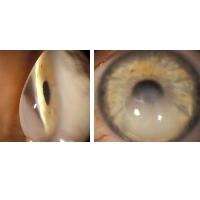Study finds genetic collagen link to corneal thickness, disease

A major national and international genetic eye disease research project led by Australian researchers has identified a family of genes related to collagen that influence corneal thickness and disease risk. The cornea is the transparent outer covering of the eye.
Winthrop Professor David Mackey, Managing Director and Chair of UWA Ophthalmology, said the finding was significant because a thin cornea was one of the risk factors for keratoconus as well as glaucoma, the second leading cause of blindness overall in Australia.
Keratoconus is a thinning of the central zone of the cornea, causing the normally round shape of the cornea to become distorted and a cone-like bulge to develop, resulting in significant visual impairment.
"Keratoconus is a leading cause of severe visual impairment in young adults and the main indication for corneal transplant in most developed countries, including Australia," Professor Mackey said.
"A combination of these gene variants can result in a person having a thinner cornea and much greater risk of developing eye diseases."
Professor Mackey said while earlier, smaller studies had identified some genes for corneal thickness variation, the study published this week in the international journal Nature Genetics combined data from 20,000 people in Australia, Europe, North America and Asia in the largest analysis to date.
"These findings allow researchers to now target specific gene pathways involving collagen to help prevent and treat keratoconus and glaucoma," Professor Mackey said.














